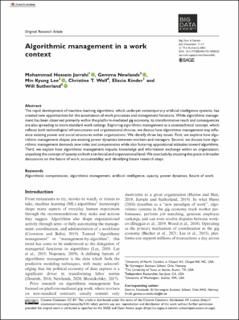| dc.contributor.author | Jarrahi, Mohammad Hossein | |
| dc.contributor.author | Newlands, Gemma Elisabeth Marjorie | |
| dc.contributor.author | Lee, Min Kyung | |
| dc.contributor.author | Wolf, Christine | |
| dc.contributor.author | Kinder, Eliscia | |
| dc.contributor.author | Sutherland, Will | |
| dc.date.accessioned | 2022-02-02T16:30:32Z | |
| dc.date.available | 2022-02-02T16:30:32Z | |
| dc.date.created | 2021-07-05T19:56:54Z | |
| dc.date.issued | 2021 | |
| dc.identifier.citation | Big Data and Society. 2021, 8 (2), 1-14. | en_US |
| dc.identifier.issn | 2053-9517 | |
| dc.identifier.uri | https://hdl.handle.net/11250/2976736 | |
| dc.description.abstract | The rapid development of machine-learning algorithms, which underpin contemporary artificial intelligence systems, has created new opportunities for the automation of work processes and management functions. While algorithmic management has been observed primarily within the platform-mediated gig economy, its transformative reach and consequences are also spreading to more standard work settings. Exploring algorithmic management as a sociotechnical concept, which reflects both technological infrastructures and organizational choices, we discuss how algorithmic management may influence existing power and social structures within organizations. We identify three key issues. First, we explore how algorithmic management shapes pre-existing power dynamics between workers and managers. Second, we discuss how algorithmic management demands new roles and competencies while also fostering oppositional attitudes toward algorithms. Third, we explain how algorithmic management impacts knowledge and information exchange within an organization, unpacking the concept of opacity on both a technical and organizational level. We conclude by situating this piece in broader discussions on the future of work, accountability, and identifying future research steps | en_US |
| dc.language.iso | eng | en_US |
| dc.publisher | Sage | en_US |
| dc.rights | Navngivelse 4.0 Internasjonal | * |
| dc.rights.uri | http://creativecommons.org/licenses/by/4.0/deed.no | * |
| dc.subject | Algorithmic competencies | en_US |
| dc.subject | Artificial intelligence | en_US |
| dc.subject | Opacity | en_US |
| dc.subject | Power dynamics | en_US |
| dc.subject | Future of work | en_US |
| dc.subject | Algorithmic management | en_US |
| dc.title | Algorithmic management in a work context | en_US |
| dc.type | Journal article | en_US |
| dc.type | Peer reviewed | en_US |
| dc.description.version | publishedVersion | en_US |
| dc.rights.holder | The Authors | en_US |
| dc.source.pagenumber | 1-14 | en_US |
| dc.source.volume | 8 | en_US |
| dc.source.journal | Big Data and Society | en_US |
| dc.source.issue | 2 | en_US |
| dc.identifier.doi | 10.1177/20539517211020332 | |
| dc.identifier.cristin | 1920368 | |
| cristin.ispublished | true | |
| cristin.fulltext | original | |
| cristin.qualitycode | 1 | |

